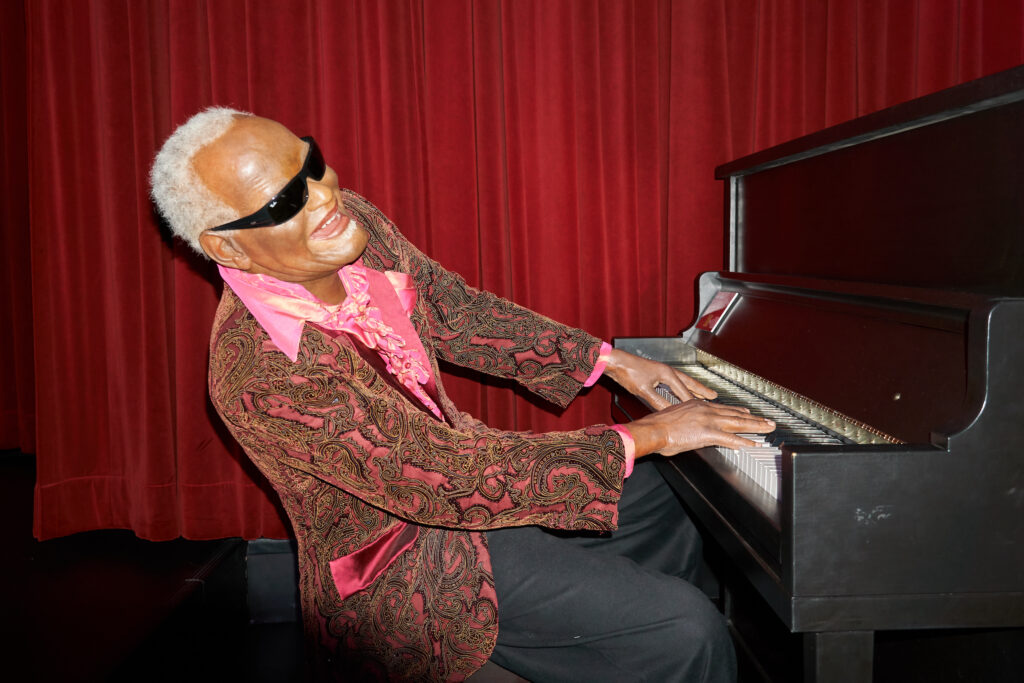In almost every photo you see of Ray Charles at the piano, he is wearing dark sunglasses. Is that because he was blind?
Ray Charles was blind. He lost his eyesight when he was seven years old. Many doctors believed that he had suffered from childhood glaucoma that resulted in him becoming blind. Either way, he maintained that his loss of sight never affected his career as a pianist.

You can learn more below about how glaucoma affects eyesight, how Ray Charles still succeeded as a musician despite his loss of vision.
Glaucoma and Blindness
Glaucoma is one of the biggest reasons why you’re supposed to go and have your eyes checked every few years. It’s a disease that happens gradually over time and if left unchecked can cause permanent damage to the eye and result in blindness.
The cause of glaucoma is damage to the optic nerve that causes an increase in pressure in the eye because of a fluid build-up. There is a fluid called the aqueous humor that flows into and out of your eye. When the optic nerve is damaged this causes the fluid to not be able to drain and then the pressure buildup happens.
There is a tissue where this fluid usually drains out of called the trabecular meshwork. However, if you have glaucoma and optic nerve damage the aqueous humor fluid is overproduced and then cannot drain properly again causing that pressure.
There are a few different types of glaucoma and they can all result in blindness. It is thought that glaucoma is mostly caused by genetic factors.
The types of glaucoma are open-angle where the trabecular meshwork becomes damaged not allowing for the fluid to drain. Open-angle glaucoma is the most common form. Then there is angle-closure glaucoma where the iris blocks the drainage path created where the iris and cornea meet.
Normal-tension glaucoma is when the optic nerve becomes damaged despite normal eye pressure. There is not much known about what causes this form of glaucoma. The same can be said of glaucoma in children where underlying medical conditions may be the cause.
Finally, pigmentary glaucoma is when pigment granules get stuck in the drainage areas and slow the draining of the fluid causing pressure and damage.
If glaucoma is left untreated it will eventually result in the sufferer becoming blind and can also cause a lot of pain due to the pressure in the eye.
You can watch Ray Charles talk about being blind in the below video.
Ray Charles suffered from glaucoma as a child and lost his eyesight when he was only seven years old. Despite that happening, he still went on to become a famous and revered musician and pianist.
Ray Charles Career with Blindness
Even with his blindness, Ray Charles still pursued a musical career. He was exposed to the piano when he was only three years old and was taught by Wylie Pitman who owned the Red Wing Cafe in Greenville, Florida.
While Charles’s love of piano was growing, his eyesight was diminishing. He began to lose his ability to see when he was only four years old and was completely blind by seven. This led his mother to find him a school that could accommodate a blind African-American boy.
He was sent to the Florida School for the Deaf and Blind in St. Augustine and it was here that he was taught how to play piano classics by composers like Bach and Mozart. His teacher taught him how to read music in braille.
He attended until his mother’s death when he was 14-years-old.
Charles then moved around Florida, sometimes living in borderline poverty, to pursue a career as a pianist for the next three years. While in Tampa he was mildly successful but knew that a move to a larger city would benefit his career greatly.
He moved to Seattle, Washington in 1948 and started his band and that’s when he began to see big success. Their singles were hits and he managed to get signed to Swing Time Records and then later Atlantic Records.
Even though he was blind, Ray Charles brought together multiple different genres to be a creator of the soul music genre. He was a huge inspiration for future artists like Elvis Presley, Aretha Franklin, Billy Joel, Van Morrison, and another blind musician, Stevie Wonder.
Ray Charles’ story goes to show that just because you have suffered a great injustice or injury does not mean that you can’t overcome the odds and achieve your dreams.